International Trade in Burundi: Challenges and Opportunities
VerifiedAdded on 2024/05/16
|11
|1397
|311
Essay
AI Summary
This essay provides an analysis of Burundi's international trade status as one of the world's poorest exporting nations. It explores the country's reliance on agriculture and labor intensity, coupled with a lack of land and technological resources. The essay delves into the Heckscher-Ohlin and Ricardian models to understand Burundi's comparative advantages and disadvantages. It highlights the nation's struggle with a negative trade balance due to a weak manufacturing sector, leading to import dependence. The discussion concludes that Burundi's persistent lack of export improvement perpetuates its status as one of the world's poorest economies, emphasizing the risks associated with international trade in its current state. Desklib offers similar essays and resources for students.
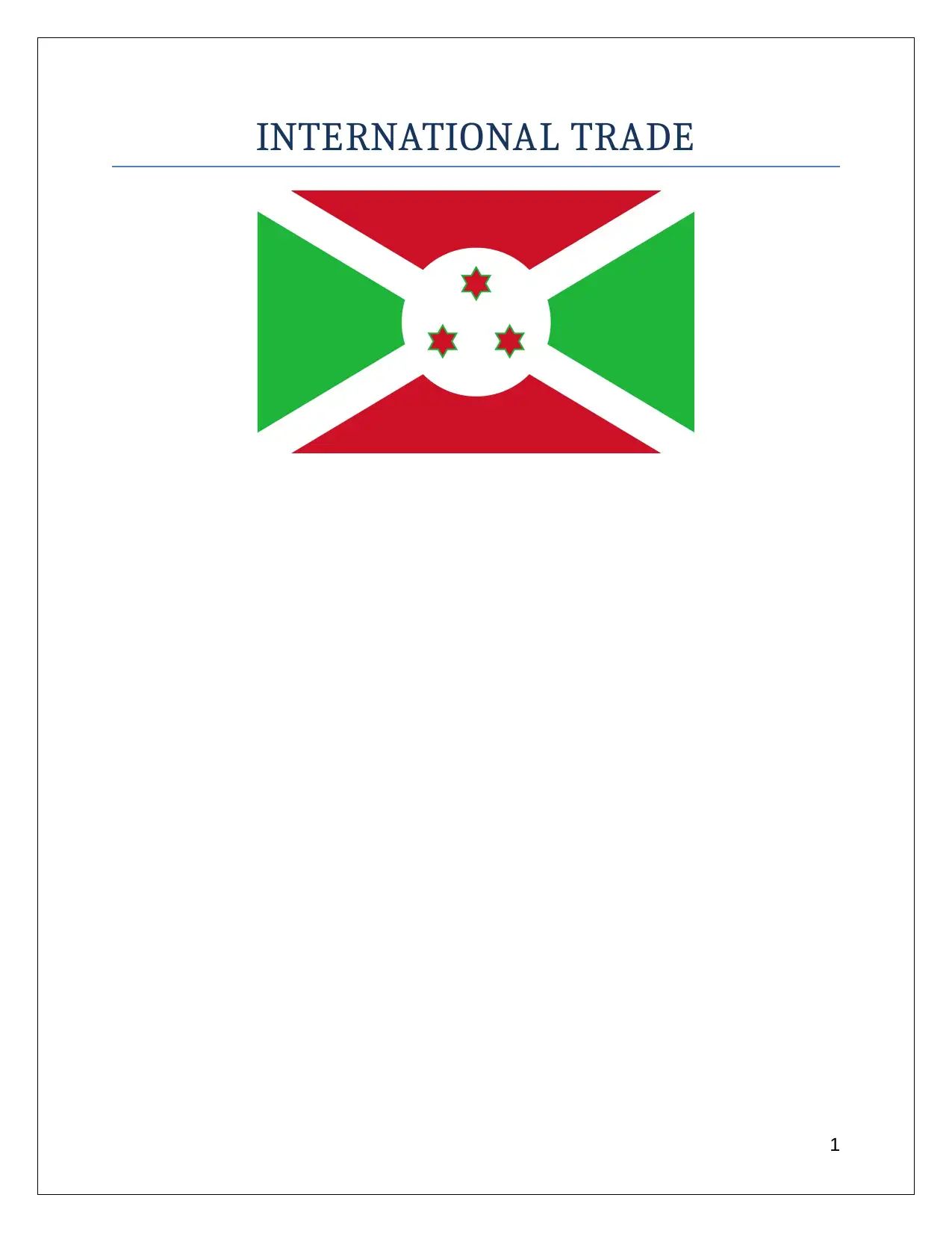
INTERNATIONAL TRADE
1
1
Paraphrase This Document
Need a fresh take? Get an instant paraphrase of this document with our AI Paraphraser
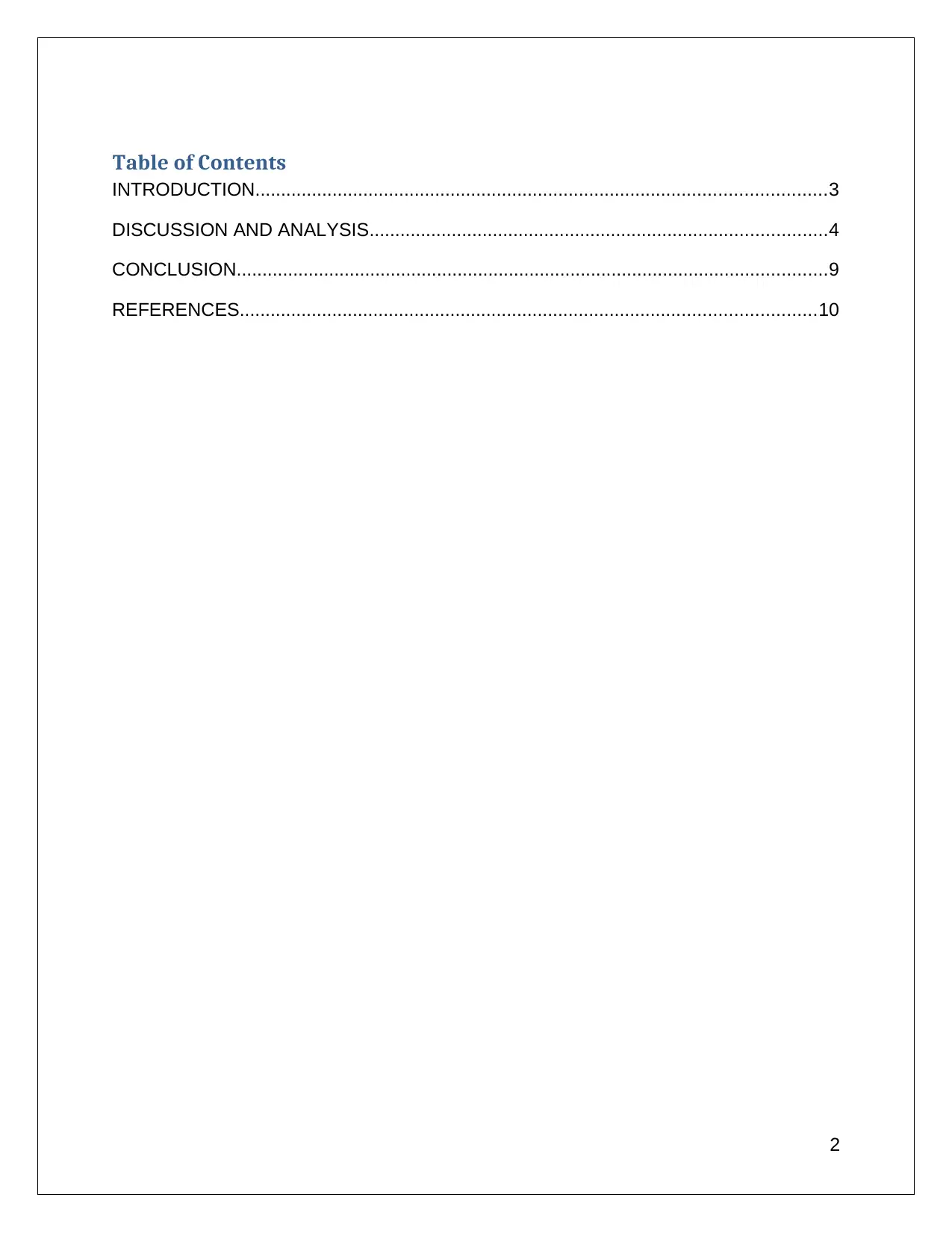
Table of Contents
INTRODUCTION...............................................................................................................3
DISCUSSION AND ANALYSIS.........................................................................................4
CONCLUSION...................................................................................................................9
REFERENCES................................................................................................................10
2
INTRODUCTION...............................................................................................................3
DISCUSSION AND ANALYSIS.........................................................................................4
CONCLUSION...................................................................................................................9
REFERENCES................................................................................................................10
2
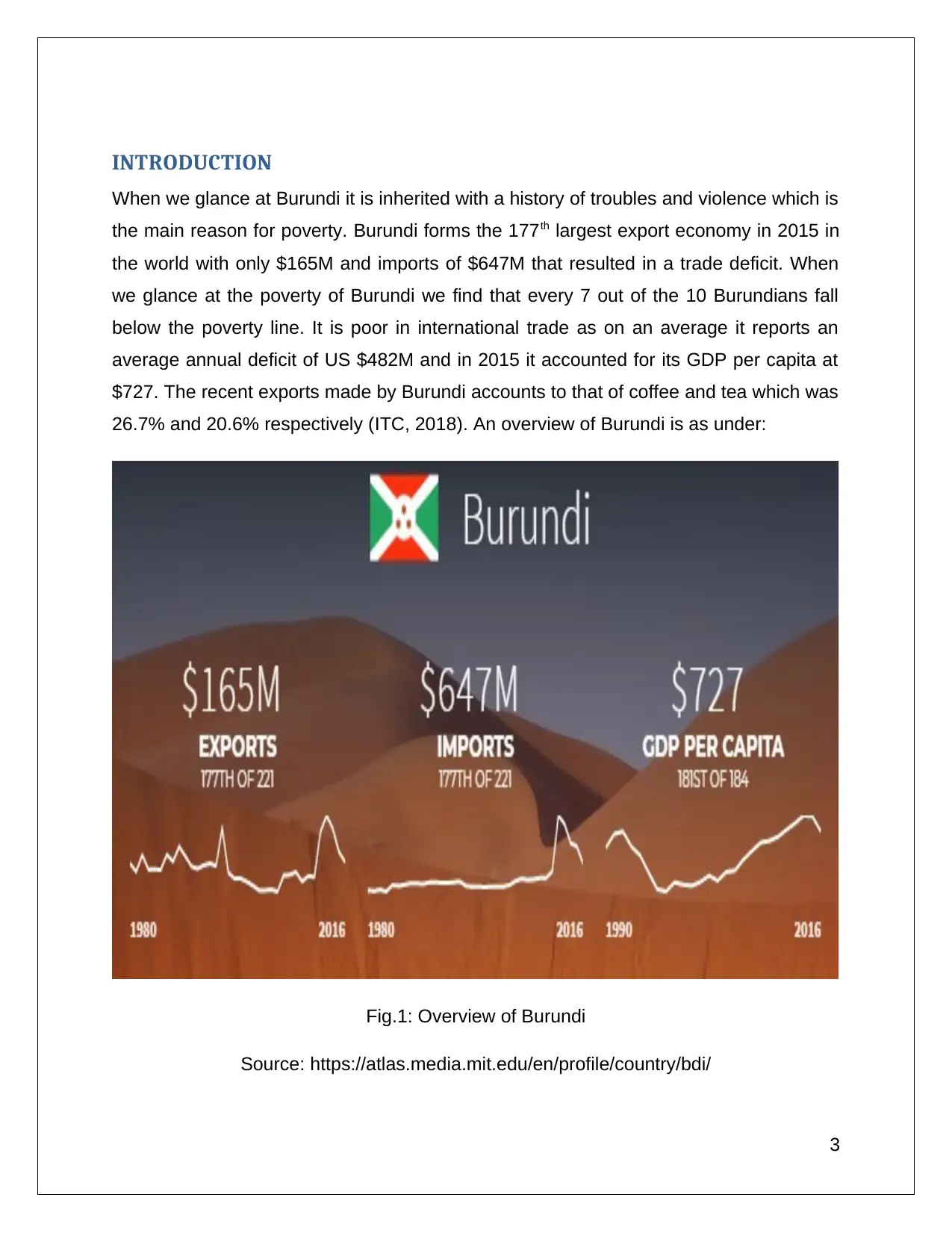
INTRODUCTION
When we glance at Burundi it is inherited with a history of troubles and violence which is
the main reason for poverty. Burundi forms the 177th largest export economy in 2015 in
the world with only $165M and imports of $647M that resulted in a trade deficit. When
we glance at the poverty of Burundi we find that every 7 out of the 10 Burundians fall
below the poverty line. It is poor in international trade as on an average it reports an
average annual deficit of US $482M and in 2015 it accounted for its GDP per capita at
$727. The recent exports made by Burundi accounts to that of coffee and tea which was
26.7% and 20.6% respectively (ITC, 2018). An overview of Burundi is as under:
Fig.1: Overview of Burundi
Source: https://atlas.media.mit.edu/en/profile/country/bdi/
3
When we glance at Burundi it is inherited with a history of troubles and violence which is
the main reason for poverty. Burundi forms the 177th largest export economy in 2015 in
the world with only $165M and imports of $647M that resulted in a trade deficit. When
we glance at the poverty of Burundi we find that every 7 out of the 10 Burundians fall
below the poverty line. It is poor in international trade as on an average it reports an
average annual deficit of US $482M and in 2015 it accounted for its GDP per capita at
$727. The recent exports made by Burundi accounts to that of coffee and tea which was
26.7% and 20.6% respectively (ITC, 2018). An overview of Burundi is as under:
Fig.1: Overview of Burundi
Source: https://atlas.media.mit.edu/en/profile/country/bdi/
3
⊘ This is a preview!⊘
Do you want full access?
Subscribe today to unlock all pages.

Trusted by 1+ million students worldwide
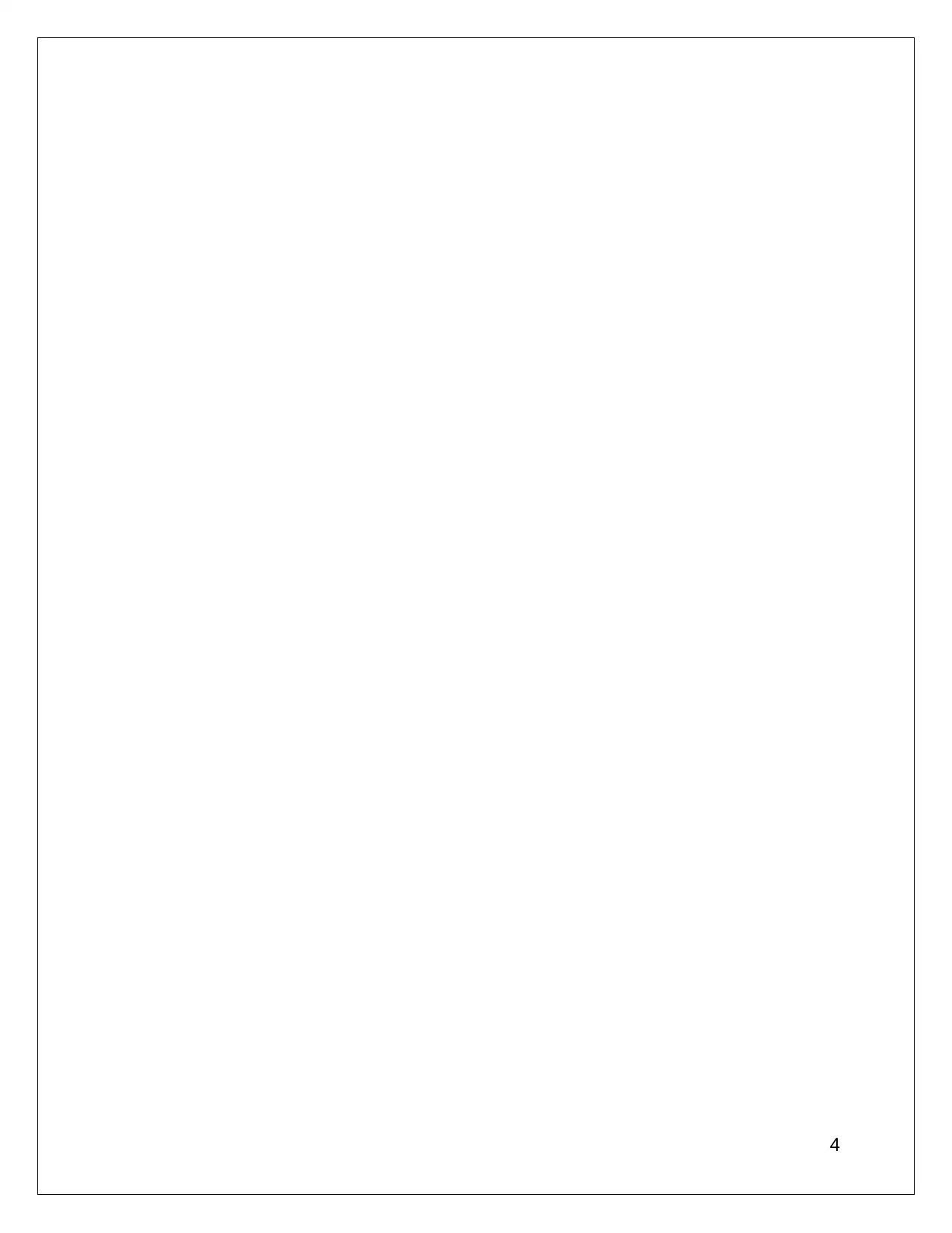
4
Paraphrase This Document
Need a fresh take? Get an instant paraphrase of this document with our AI Paraphraser
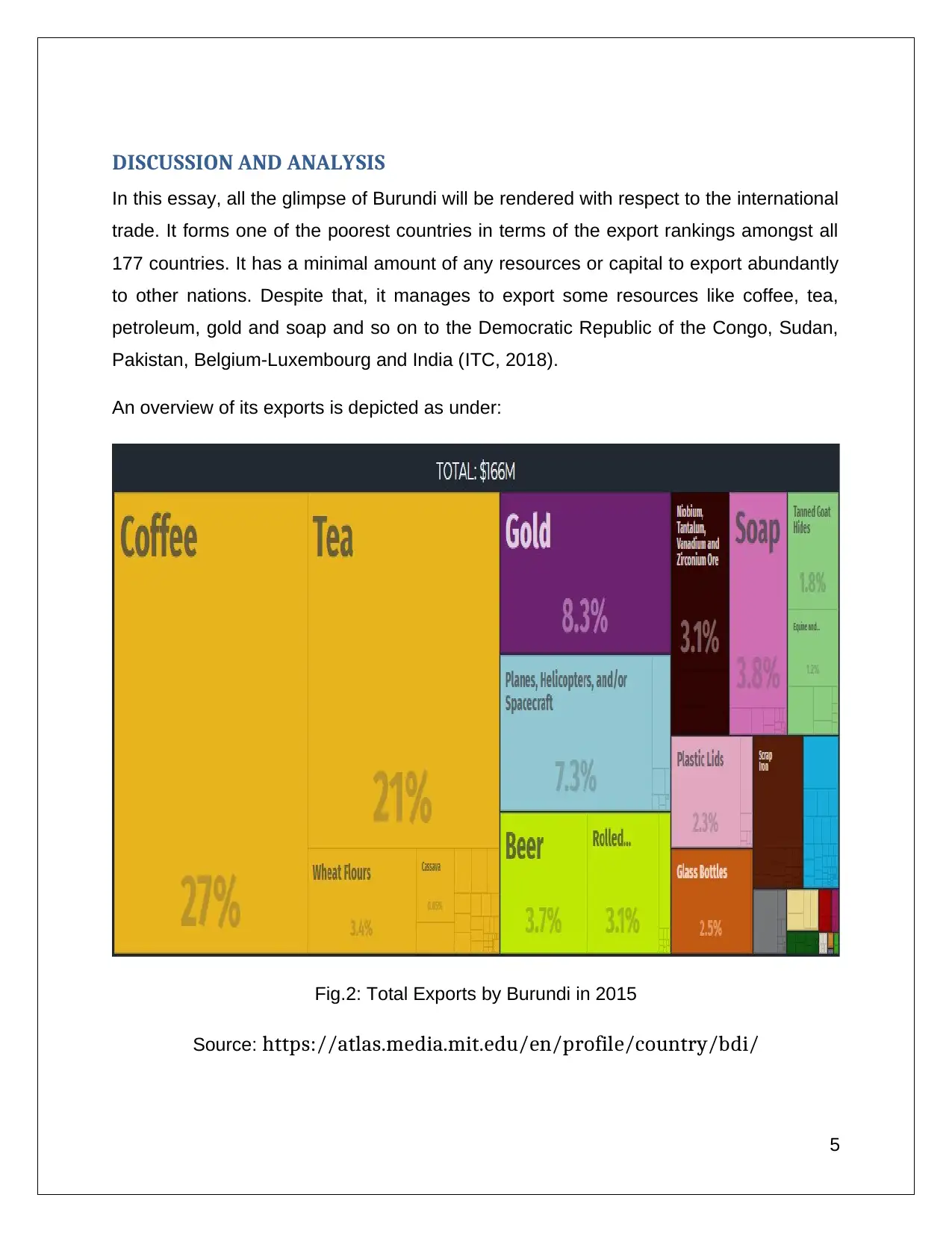
DISCUSSION AND ANALYSIS
In this essay, all the glimpse of Burundi will be rendered with respect to the international
trade. It forms one of the poorest countries in terms of the export rankings amongst all
177 countries. It has a minimal amount of any resources or capital to export abundantly
to other nations. Despite that, it manages to export some resources like coffee, tea,
petroleum, gold and soap and so on to the Democratic Republic of the Congo, Sudan,
Pakistan, Belgium-Luxembourg and India (ITC, 2018).
An overview of its exports is depicted as under:
Fig.2: Total Exports by Burundi in 2015
Source: https://atlas.media.mit.edu/en/profile/country/bdi/
5
In this essay, all the glimpse of Burundi will be rendered with respect to the international
trade. It forms one of the poorest countries in terms of the export rankings amongst all
177 countries. It has a minimal amount of any resources or capital to export abundantly
to other nations. Despite that, it manages to export some resources like coffee, tea,
petroleum, gold and soap and so on to the Democratic Republic of the Congo, Sudan,
Pakistan, Belgium-Luxembourg and India (ITC, 2018).
An overview of its exports is depicted as under:
Fig.2: Total Exports by Burundi in 2015
Source: https://atlas.media.mit.edu/en/profile/country/bdi/
5
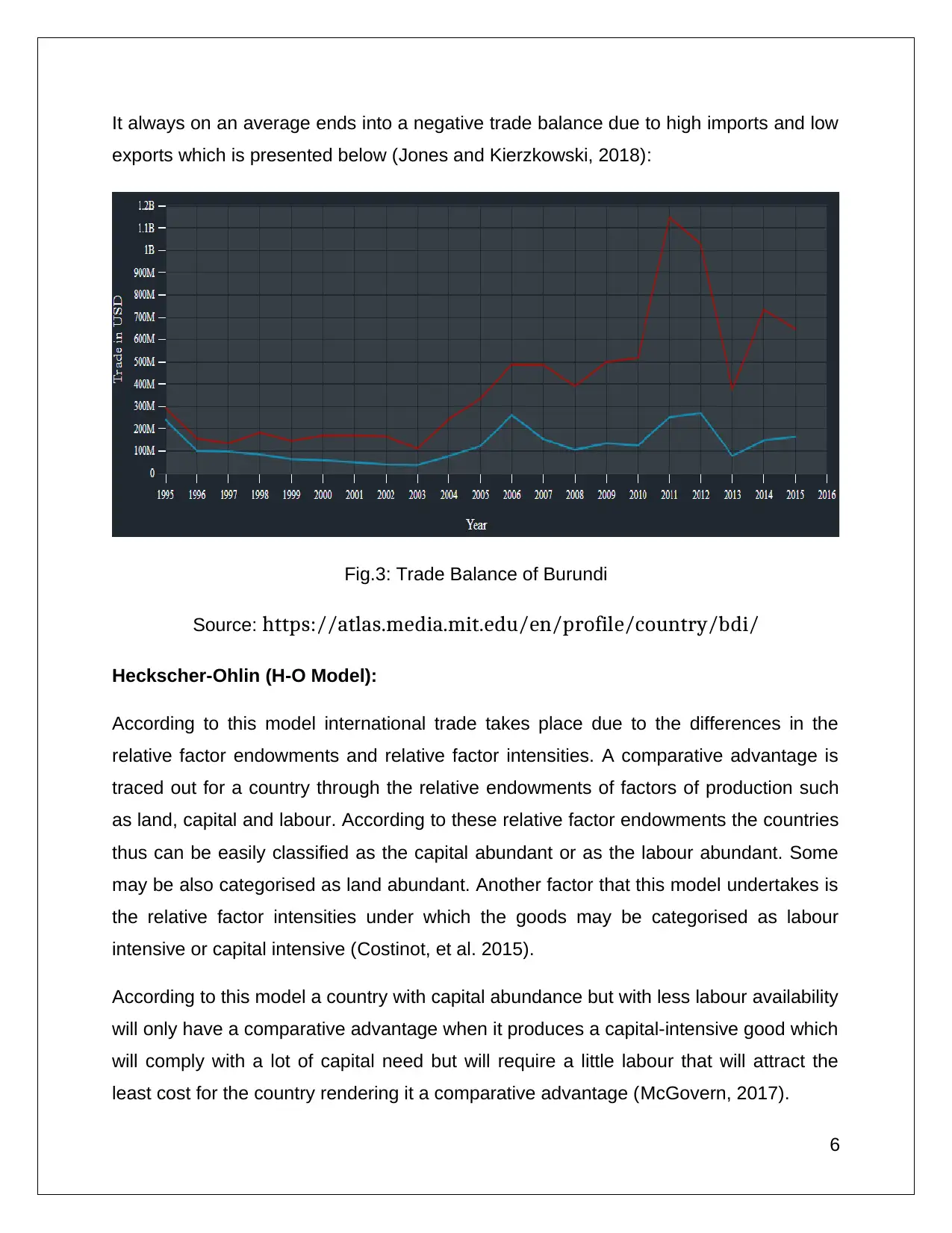
It always on an average ends into a negative trade balance due to high imports and low
exports which is presented below (Jones and Kierzkowski, 2018):
Fig.3: Trade Balance of Burundi
Source: https://atlas.media.mit.edu/en/profile/country/bdi/
Heckscher-Ohlin (H-O Model):
According to this model international trade takes place due to the differences in the
relative factor endowments and relative factor intensities. A comparative advantage is
traced out for a country through the relative endowments of factors of production such
as land, capital and labour. According to these relative factor endowments the countries
thus can be easily classified as the capital abundant or as the labour abundant. Some
may be also categorised as land abundant. Another factor that this model undertakes is
the relative factor intensities under which the goods may be categorised as labour
intensive or capital intensive (Costinot, et al. 2015).
According to this model a country with capital abundance but with less labour availability
will only have a comparative advantage when it produces a capital-intensive good which
will comply with a lot of capital need but will require a little labour that will attract the
least cost for the country rendering it a comparative advantage (McGovern, 2017).
6
exports which is presented below (Jones and Kierzkowski, 2018):
Fig.3: Trade Balance of Burundi
Source: https://atlas.media.mit.edu/en/profile/country/bdi/
Heckscher-Ohlin (H-O Model):
According to this model international trade takes place due to the differences in the
relative factor endowments and relative factor intensities. A comparative advantage is
traced out for a country through the relative endowments of factors of production such
as land, capital and labour. According to these relative factor endowments the countries
thus can be easily classified as the capital abundant or as the labour abundant. Some
may be also categorised as land abundant. Another factor that this model undertakes is
the relative factor intensities under which the goods may be categorised as labour
intensive or capital intensive (Costinot, et al. 2015).
According to this model a country with capital abundance but with less labour availability
will only have a comparative advantage when it produces a capital-intensive good which
will comply with a lot of capital need but will require a little labour that will attract the
least cost for the country rendering it a comparative advantage (McGovern, 2017).
6
⊘ This is a preview!⊘
Do you want full access?
Subscribe today to unlock all pages.

Trusted by 1+ million students worldwide
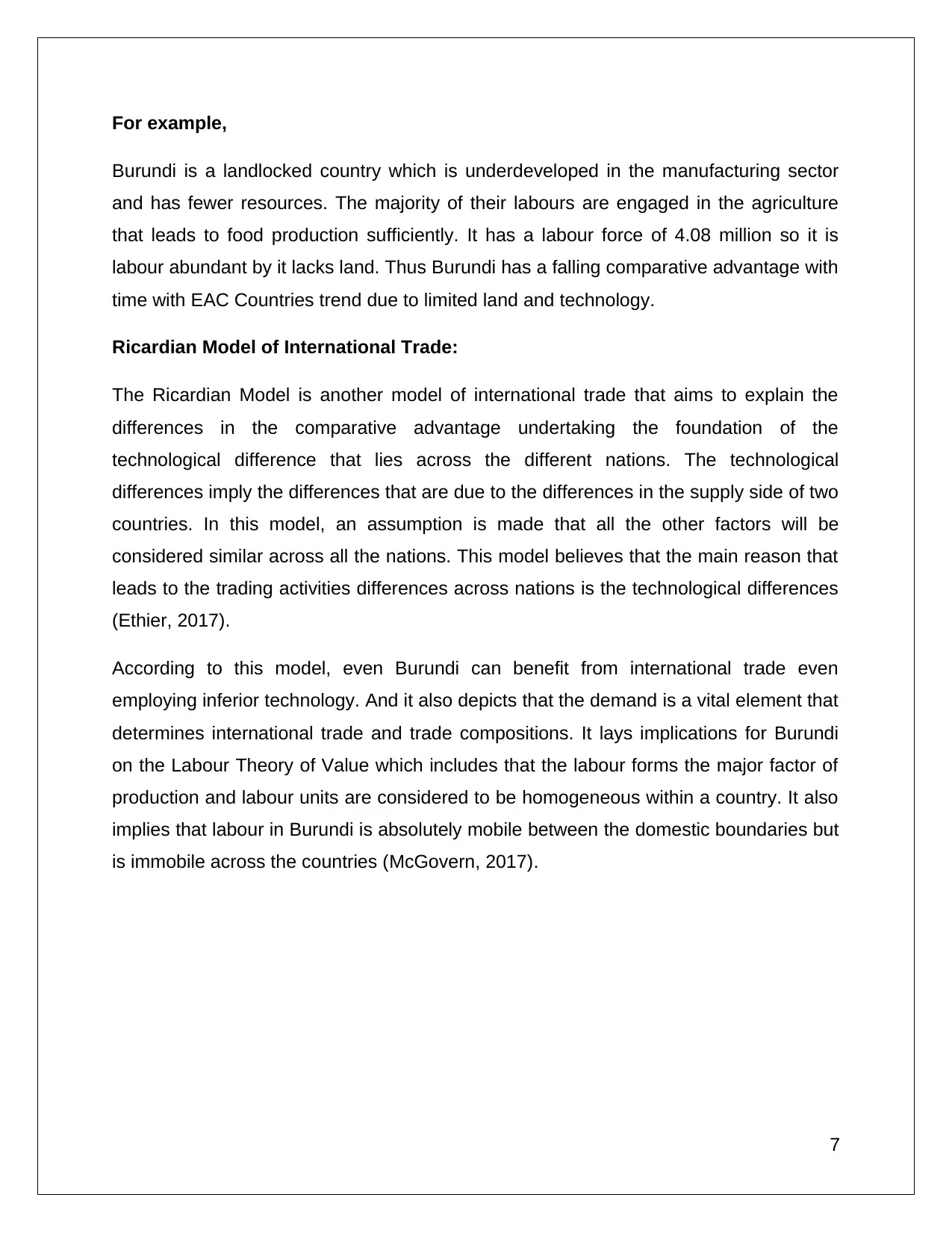
For example,
Burundi is a landlocked country which is underdeveloped in the manufacturing sector
and has fewer resources. The majority of their labours are engaged in the agriculture
that leads to food production sufficiently. It has a labour force of 4.08 million so it is
labour abundant by it lacks land. Thus Burundi has a falling comparative advantage with
time with EAC Countries trend due to limited land and technology.
Ricardian Model of International Trade:
The Ricardian Model is another model of international trade that aims to explain the
differences in the comparative advantage undertaking the foundation of the
technological difference that lies across the different nations. The technological
differences imply the differences that are due to the differences in the supply side of two
countries. In this model, an assumption is made that all the other factors will be
considered similar across all the nations. This model believes that the main reason that
leads to the trading activities differences across nations is the technological differences
(Ethier, 2017).
According to this model, even Burundi can benefit from international trade even
employing inferior technology. And it also depicts that the demand is a vital element that
determines international trade and trade compositions. It lays implications for Burundi
on the Labour Theory of Value which includes that the labour forms the major factor of
production and labour units are considered to be homogeneous within a country. It also
implies that labour in Burundi is absolutely mobile between the domestic boundaries but
is immobile across the countries (McGovern, 2017).
7
Burundi is a landlocked country which is underdeveloped in the manufacturing sector
and has fewer resources. The majority of their labours are engaged in the agriculture
that leads to food production sufficiently. It has a labour force of 4.08 million so it is
labour abundant by it lacks land. Thus Burundi has a falling comparative advantage with
time with EAC Countries trend due to limited land and technology.
Ricardian Model of International Trade:
The Ricardian Model is another model of international trade that aims to explain the
differences in the comparative advantage undertaking the foundation of the
technological difference that lies across the different nations. The technological
differences imply the differences that are due to the differences in the supply side of two
countries. In this model, an assumption is made that all the other factors will be
considered similar across all the nations. This model believes that the main reason that
leads to the trading activities differences across nations is the technological differences
(Ethier, 2017).
According to this model, even Burundi can benefit from international trade even
employing inferior technology. And it also depicts that the demand is a vital element that
determines international trade and trade compositions. It lays implications for Burundi
on the Labour Theory of Value which includes that the labour forms the major factor of
production and labour units are considered to be homogeneous within a country. It also
implies that labour in Burundi is absolutely mobile between the domestic boundaries but
is immobile across the countries (McGovern, 2017).
7
Paraphrase This Document
Need a fresh take? Get an instant paraphrase of this document with our AI Paraphraser
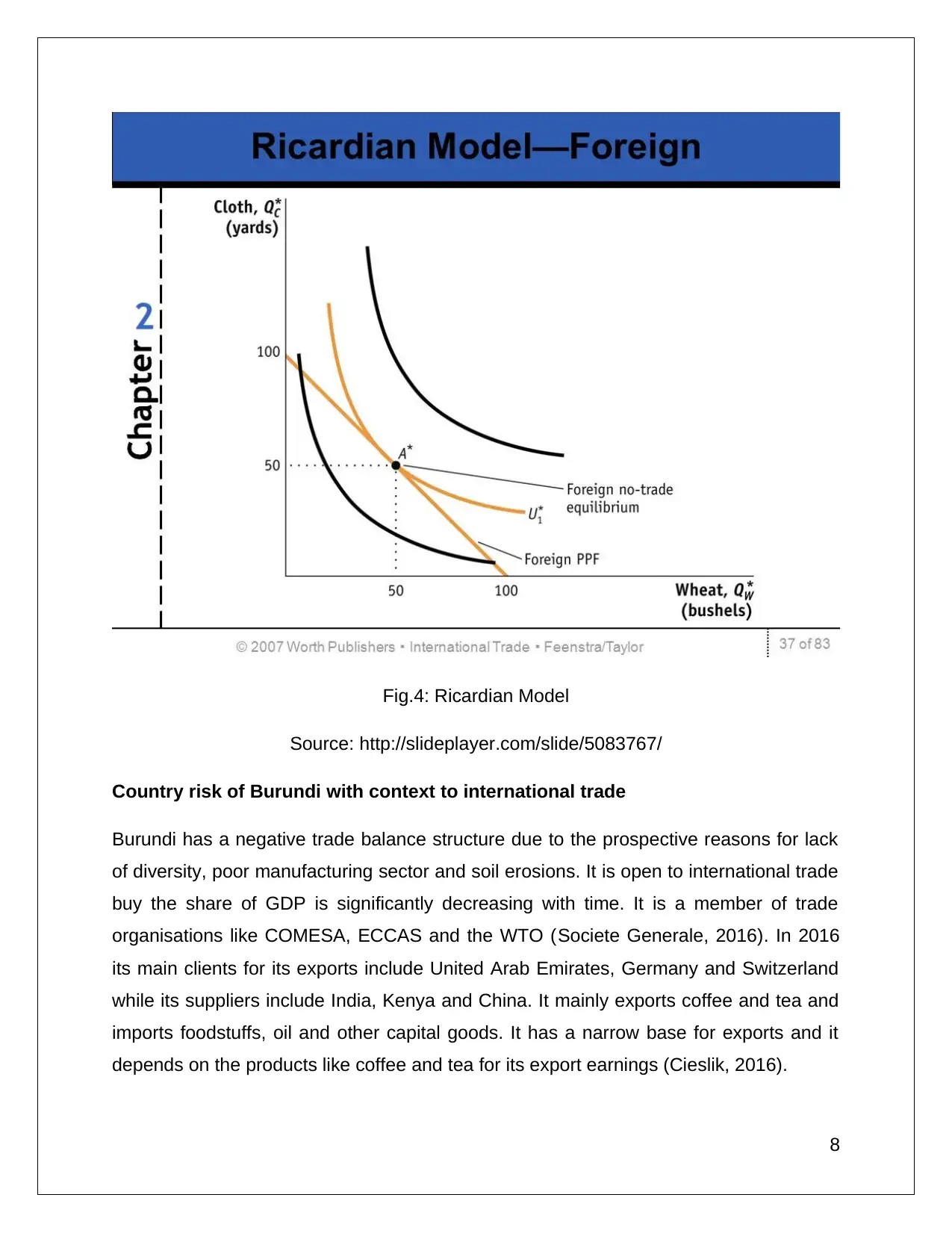
Fig.4: Ricardian Model
Source: http://slideplayer.com/slide/5083767/
Country risk of Burundi with context to international trade
Burundi has a negative trade balance structure due to the prospective reasons for lack
of diversity, poor manufacturing sector and soil erosions. It is open to international trade
buy the share of GDP is significantly decreasing with time. It is a member of trade
organisations like COMESA, ECCAS and the WTO (Societe Generale, 2016). In 2016
its main clients for its exports include United Arab Emirates, Germany and Switzerland
while its suppliers include India, Kenya and China. It mainly exports coffee and tea and
imports foodstuffs, oil and other capital goods. It has a narrow base for exports and it
depends on the products like coffee and tea for its export earnings (Cieslik, 2016).
8
Source: http://slideplayer.com/slide/5083767/
Country risk of Burundi with context to international trade
Burundi has a negative trade balance structure due to the prospective reasons for lack
of diversity, poor manufacturing sector and soil erosions. It is open to international trade
buy the share of GDP is significantly decreasing with time. It is a member of trade
organisations like COMESA, ECCAS and the WTO (Societe Generale, 2016). In 2016
its main clients for its exports include United Arab Emirates, Germany and Switzerland
while its suppliers include India, Kenya and China. It mainly exports coffee and tea and
imports foodstuffs, oil and other capital goods. It has a narrow base for exports and it
depends on the products like coffee and tea for its export earnings (Cieslik, 2016).
8
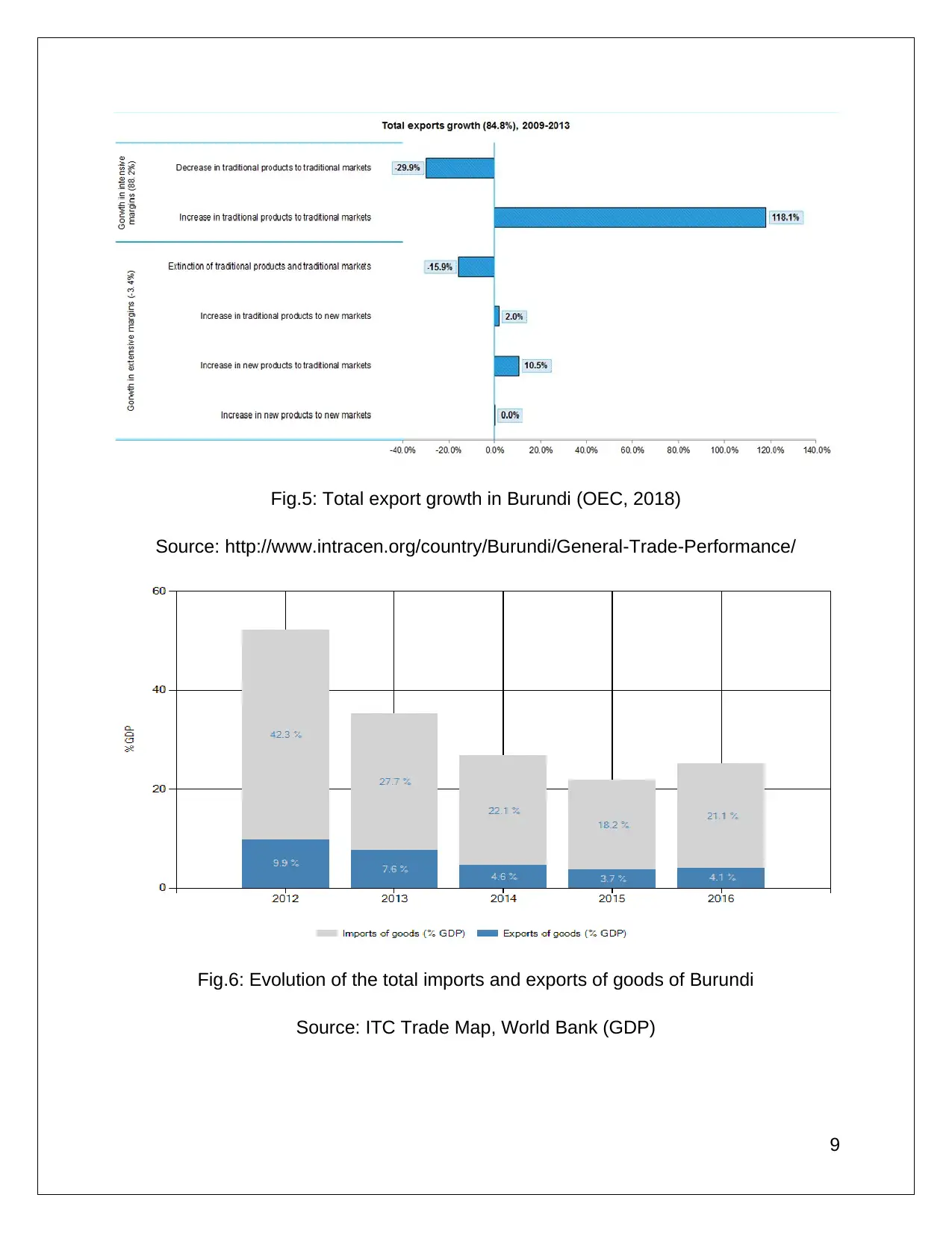
Fig.5: Total export growth in Burundi (OEC, 2018)
Source: http://www.intracen.org/country/Burundi/General-Trade-Performance/
Fig.6: Evolution of the total imports and exports of goods of Burundi
Source: ITC Trade Map, World Bank (GDP)
9
Source: http://www.intracen.org/country/Burundi/General-Trade-Performance/
Fig.6: Evolution of the total imports and exports of goods of Burundi
Source: ITC Trade Map, World Bank (GDP)
9
⊘ This is a preview!⊘
Do you want full access?
Subscribe today to unlock all pages.

Trusted by 1+ million students worldwide
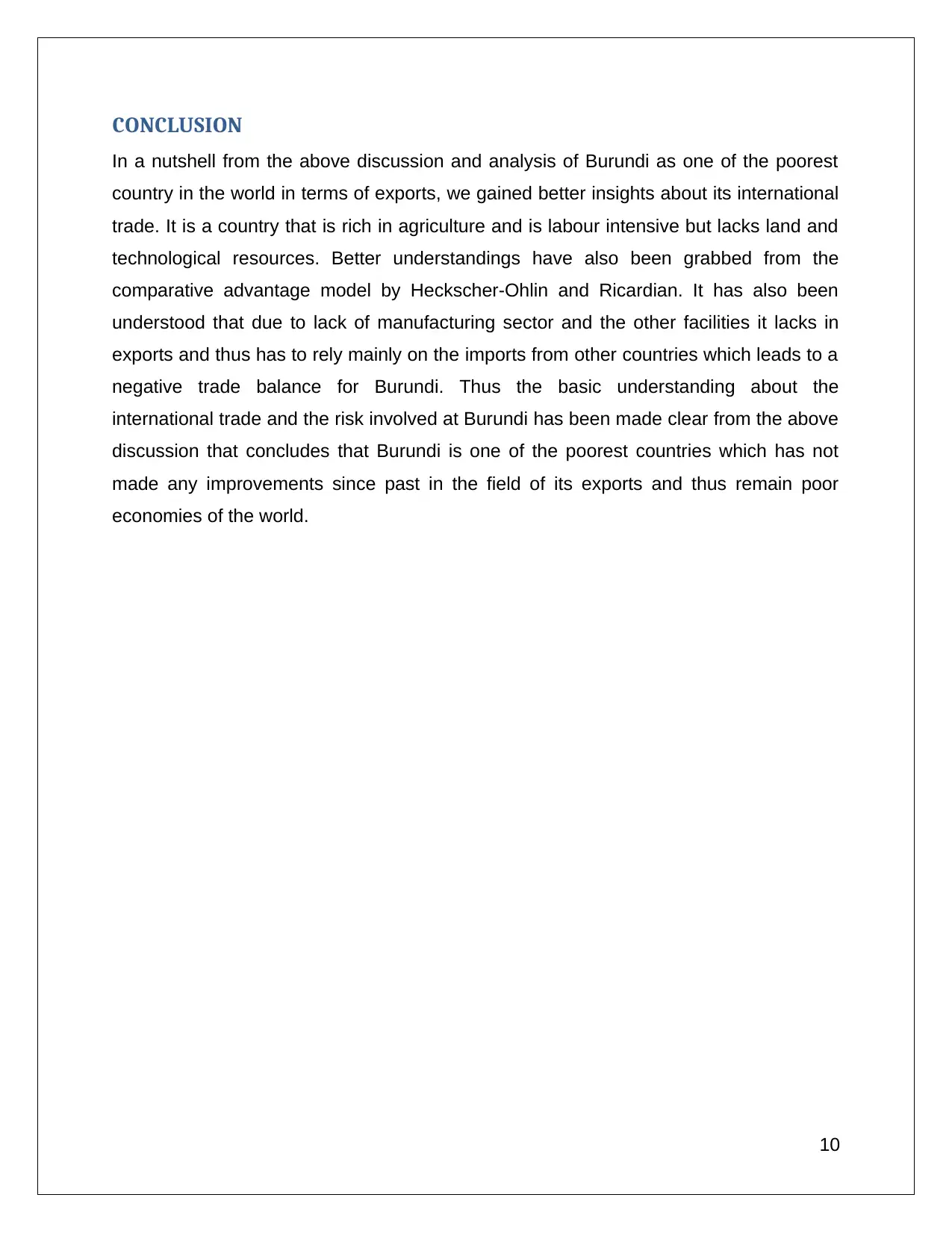
CONCLUSION
In a nutshell from the above discussion and analysis of Burundi as one of the poorest
country in the world in terms of exports, we gained better insights about its international
trade. It is a country that is rich in agriculture and is labour intensive but lacks land and
technological resources. Better understandings have also been grabbed from the
comparative advantage model by Heckscher-Ohlin and Ricardian. It has also been
understood that due to lack of manufacturing sector and the other facilities it lacks in
exports and thus has to rely mainly on the imports from other countries which leads to a
negative trade balance for Burundi. Thus the basic understanding about the
international trade and the risk involved at Burundi has been made clear from the above
discussion that concludes that Burundi is one of the poorest countries which has not
made any improvements since past in the field of its exports and thus remain poor
economies of the world.
10
In a nutshell from the above discussion and analysis of Burundi as one of the poorest
country in the world in terms of exports, we gained better insights about its international
trade. It is a country that is rich in agriculture and is labour intensive but lacks land and
technological resources. Better understandings have also been grabbed from the
comparative advantage model by Heckscher-Ohlin and Ricardian. It has also been
understood that due to lack of manufacturing sector and the other facilities it lacks in
exports and thus has to rely mainly on the imports from other countries which leads to a
negative trade balance for Burundi. Thus the basic understanding about the
international trade and the risk involved at Burundi has been made clear from the above
discussion that concludes that Burundi is one of the poorest countries which has not
made any improvements since past in the field of its exports and thus remain poor
economies of the world.
10
Paraphrase This Document
Need a fresh take? Get an instant paraphrase of this document with our AI Paraphraser
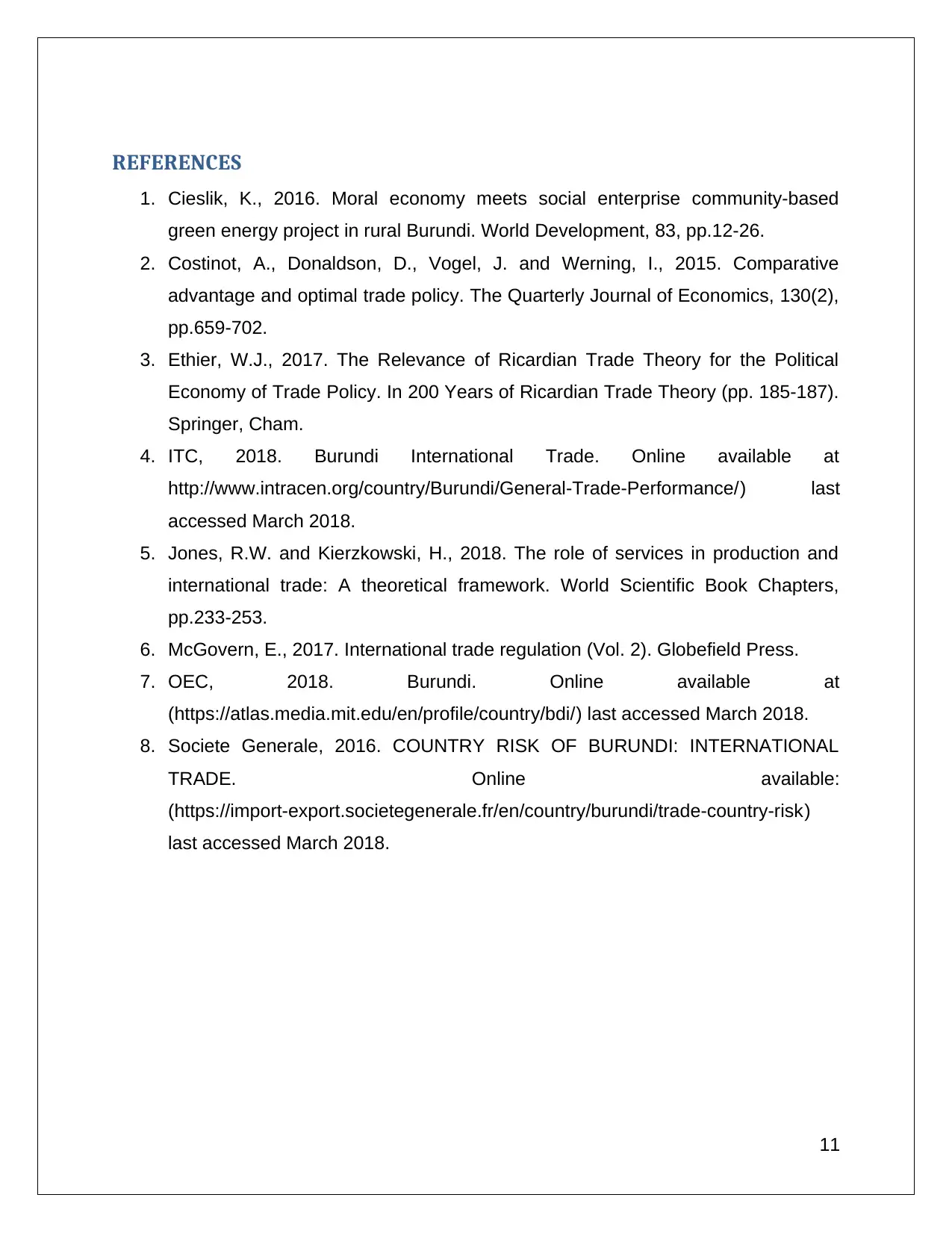
REFERENCES
1. Cieslik, K., 2016. Moral economy meets social enterprise community-based
green energy project in rural Burundi. World Development, 83, pp.12-26.
2. Costinot, A., Donaldson, D., Vogel, J. and Werning, I., 2015. Comparative
advantage and optimal trade policy. The Quarterly Journal of Economics, 130(2),
pp.659-702.
3. Ethier, W.J., 2017. The Relevance of Ricardian Trade Theory for the Political
Economy of Trade Policy. In 200 Years of Ricardian Trade Theory (pp. 185-187).
Springer, Cham.
4. ITC, 2018. Burundi International Trade. Online available at
http://www.intracen.org/country/Burundi/General-Trade-Performance/) last
accessed March 2018.
5. Jones, R.W. and Kierzkowski, H., 2018. The role of services in production and
international trade: A theoretical framework. World Scientific Book Chapters,
pp.233-253.
6. McGovern, E., 2017. International trade regulation (Vol. 2). Globefield Press.
7. OEC, 2018. Burundi. Online available at
(https://atlas.media.mit.edu/en/profile/country/bdi/) last accessed March 2018.
8. Societe Generale, 2016. COUNTRY RISK OF BURUNDI: INTERNATIONAL
TRADE. Online available:
(https://import-export.societegenerale.fr/en/country/burundi/trade-country-risk)
last accessed March 2018.
11
1. Cieslik, K., 2016. Moral economy meets social enterprise community-based
green energy project in rural Burundi. World Development, 83, pp.12-26.
2. Costinot, A., Donaldson, D., Vogel, J. and Werning, I., 2015. Comparative
advantage and optimal trade policy. The Quarterly Journal of Economics, 130(2),
pp.659-702.
3. Ethier, W.J., 2017. The Relevance of Ricardian Trade Theory for the Political
Economy of Trade Policy. In 200 Years of Ricardian Trade Theory (pp. 185-187).
Springer, Cham.
4. ITC, 2018. Burundi International Trade. Online available at
http://www.intracen.org/country/Burundi/General-Trade-Performance/) last
accessed March 2018.
5. Jones, R.W. and Kierzkowski, H., 2018. The role of services in production and
international trade: A theoretical framework. World Scientific Book Chapters,
pp.233-253.
6. McGovern, E., 2017. International trade regulation (Vol. 2). Globefield Press.
7. OEC, 2018. Burundi. Online available at
(https://atlas.media.mit.edu/en/profile/country/bdi/) last accessed March 2018.
8. Societe Generale, 2016. COUNTRY RISK OF BURUNDI: INTERNATIONAL
TRADE. Online available:
(https://import-export.societegenerale.fr/en/country/burundi/trade-country-risk)
last accessed March 2018.
11
1 out of 11
Your All-in-One AI-Powered Toolkit for Academic Success.
+13062052269
info@desklib.com
Available 24*7 on WhatsApp / Email
![[object Object]](/_next/static/media/star-bottom.7253800d.svg)
Unlock your academic potential
Copyright © 2020–2026 A2Z Services. All Rights Reserved. Developed and managed by ZUCOL.
